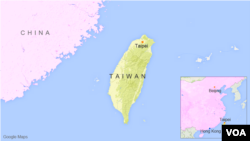The Obama administration's Wednesday announcement that it plans to sell $1.83 billion in arms to Taiwan has drawn official protest from China, which is threatening arms manufacturers with sanctions.
China's Vice Foreign Minister Zheng Zeguang summoned U.S. Charge d'Affaires Kaye Lee, the second-highest ranking U.S. diplomat in Beijing. The Chinese foreign ministry said in a statement that Zheng said China will "take necessary measures, including the imposition of sanctions against companies participating in the arms sale to Taiwan."
The U.S. State Department formally notified Congress Wednesday of its plan to sell two naval warships, anti-tank missiles, amphibious assault vehicles and Stinger surface-to-air missiles. It's the first arms package sale to Taiwan in four years.
China regards Taiwan as part of its territory, and has threatened to invade the island if it declares its independence.
A spokesman for China's foreign ministry urged the Obama administration to cancel the sale "and do something more conducive for China-U.S. relations and the peaceful development of the cross-Strait relations."
U.S. State Department spokesman David McKeeby said the deal is consistent with the U.S. commitment to provide sufficient weapons to maintain Taiwan's ability to defend itself.
The massive contract, which includes two Perry-class Frigates, Javelin anti-tank missiles, TOW 2B anti-tank missiles, AAV-7 Amphibious Assault Vehicles and a range of other equipment, comes at a time of reconciliation between China and Taiwan, which have been separated since 1949. The deal also coincides with Washington's worries that Beijing is militarizing parts of the South China Sea.
The White House decision found wide support Thursday on Capitol Hill, with lawmakers from both parties expressing praise for the deal.
"I have always felt very kindly toward the brave people of Taiwan, who faces all kinds of threats [and] bullying by the Beijing government, and ... I think the U.S. needs to stand behind Taiwan and help them in any way they can," said Congressman Eliot Engel (D-NY), ranking member on the House Foreign Affairs Committee.
Republicans also welcomed the arms sale, but criticized the Obama administration for delaying action.
"We need for it to be over and done with," said Congressman Randy Weber (R-TX). "They need those arms.”
China analyst Ian Easton of the Project 2049 Institute called the sale "a strategic message" that signals "a renewed commitment to a free, democratic and secure Taiwan."
"And that makes it very important at the strategic level, and also important at the tactical level," he told VOA. "The most important thing is the political message that it sent to Beijing and Taipei."
According to Asia military expert Richard Fisher of the International Assessment and Strategy Center, the sale is critical to maintaining peaceable cross-strait relations.
“Our arms sales to Taiwan, continued arm sales, make it possible [to maintain] what [China's] foreign minister called for the peaceful development of cross strait relations," he said. "It gives Taiwan the confidence that it requires to go forward in its attempt to fashion a peaceful relationship with China."
He also said the deal serves to preserve peaceful U.S.-China relations.
Although Washington does not formally recognize Taiwan's government, federal law requires the United States to sell arms to the self-ruled island.
Yang Chen contributed to this story from Capitol Hill. This story was produced in collaboration with the VOA Mandarin service.






